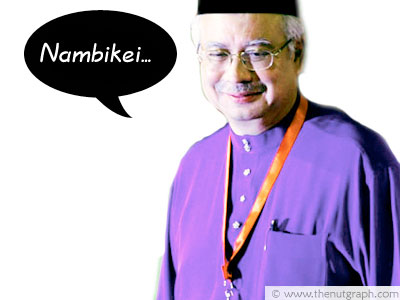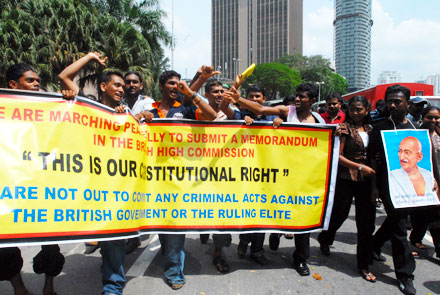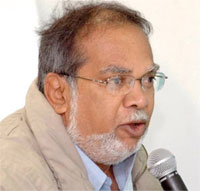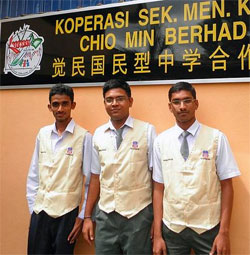 It
took only 24 years after the death of the Prophet Muhammad for Muslims
to engage in three civil wars over a period of another 24 years. And
this is because the cause played second fiddle to everything else. Hence
I am worried when people forget the cause and argue about movements and
leaders. And when corruption was allowed to flourish, the period which
came to be known as the Golden Age of Islam came to an end.
It
took only 24 years after the death of the Prophet Muhammad for Muslims
to engage in three civil wars over a period of another 24 years. And
this is because the cause played second fiddle to everything else. Hence
I am worried when people forget the cause and argue about movements and
leaders. And when corruption was allowed to flourish, the period which
came to be known as the Golden Age of Islam came to an end.NO HOLDS BARRED
Raja Petra Kamarudin
If I were asked what were the significant events in Islamic history (we are talking history here, not religion), I would probably reply the three major civil wars fought amongst Muslims from 656 to 680 (read more below). I am of the opinion that those 24 years changed the course of Islamic history forever. And the result of that is Muslims are now divided and more Muslims have died at the hands of fellow Muslims than at the hands of the Jews, the traditional enemy of the Muslims.
Today, the Sunnis label the Shias as deviants, heretics, apostates, etc., and vice versa. This is no different from Christendom, say, of 500 years ago, where Protestants and Catholics would slaughter each other for that same reason. Today, the Christians no longer slaughter each other but this does not mean that they agree with each others’ teachings. It is just that they no longer kill each other over these differences in dogma.
And why did this happen? Why do people who share the same God and the same Prophet slaughter each other? The fact that when the Saud-Wahhabi army swept across the Arabian Peninsular and parts of the Ottoman Empire -- in the 1740s, in the early 1800s, and again after the First World War -- and they butchered Muslims but spared the Jews and Christians gives an impression that fellow Muslims are the Muslims’ greatest enemy.
Is it not ironical that the Muslim army slaughtered fellow Muslims but spared the Jews and Christians? I suppose it would not be when you consider that the Muslims and Christians got along well with each other in Spain for nearly 800 years from the 700s to 1492 but Muslims slaughtered Muslims and Christians slaughtered Christians during that same era.
The reason for this is simple enough to analyse. Most people put their loyalty to the organisation or to their leader as paramount and above the cause. When movements or leaders override the cause then that is what happens. Muslims forget that they are brothers-of-the-faith and unite under the banner of a movement or a leader. Hence Islam saw three major civil wars that divided the Muslims forever.
It took only 24 years after the death of the Prophet Muhammad for Muslims to engage in three civil wars over a period of another 24 years. And this is because the cause played second fiddle to everything else. Hence I am worried when people forget the cause and argue about movements and leaders. And when corruption was allowed to flourish, the period which came to be known as the Golden Age of Islam came to an end.
Have we learned nothing from history? Why do we keep repeating the mistakes of history? And for that very reason I am not prepared to compromise the cause for the sake of any movement or leader or allow corruption to go unchallenged. I have learned from almost 1,500 years of Islamic history.
****************************************
The First Islamic Civil WarThe First Islamic Civil War (656–661), also called the First Fitna (Arabic: فتنة مقتل عثمان; Transliteration: Fitnat Maqtal Uthmān "The Fitna of the killing of Uthman"), was the first major civil war within the Islamic Caliphate. It arose as a result of the death of the previous Caliph Uthman.
The Fitna began as a series of revolts fought against first Imam of Shia'a and fourth and final of the Sunni Rightly Guided Caliphs Ali ibn Abi Talib, caused by the controversial assassination of his predecessor, Uthman Ibn Affan. It lasted for the entirety of Ali's reign, and its end is marked by Muawiyah's assumption of the caliphate (founding the Umayyad dynasty), and the subsequent recorded peace treaty between him and Hassan ibn Ali.
Uthman was besieged in his house by rebels and rioters, culminating in his assassination in July 656. Main reason for their dissatisfaction with Uthman was, his appointing family members as governors in key Islamic provinces. Ali ibn Abi Talib was then chosen by public as fourth Caliph.
Ali was first opposed by a faction led by Talhah, Al-Zubayr and Muhammad's wife, Aisha bint Abu Bakr. First they gathered in Mecca then moved to Basra with the expectation of finding the necessary forces and resources to mobilize people in what is now Iraq. The opposers encamped close to Basra, and the subsequent heated exchange & protests during the parley turned from words to blows, leading to loss of life on both sides. When Ali asked them for obedience and a pledge of allegiance, they refused. Ali tried to negotiate with Aisha considering her the venerated wife of Muhammad (S.A.W), but she refused. At last,the two parties met at the Battle of Bassorah (Battle of the Camel) in 656, where Ali emerged victorious. (READ MORE HERE: http://en.wikipedia.org/wiki/First_Fitna)
****************************************
Battle of the CamelAisha had long hated Ali, and wished that, when the aged Uthman died, her own kinsman, Zubayr, should become caliph. When Uthman was assassinated, she was not in Medina, having gone to Mecca a few weeks previously to perform the pilgrimage. The news of Uthman's murder reached her when she was on the way back. She returned immediately to Mecca and incited the citizens against Ali. The fiery address set a match to the smouldering fire of discontent. The first to respond to Aisha's call was Abdullah bin Amur, the Uthmanid governor of Mecca. Those Umayyads who had fled from Medina after the ghastly murder of Uthman now also joined Aisha, and when Talha and Zubayr came over to Aisha, many more of the Qoraish clamoured to join in the rebellion. Aisha advocated march on Basra. Throwing off the veil ordained, Aisha now took command of the army. The money to equip it came from Yamen treasury, brought to Mecca by the governor whom Ali had deposed. It is however clear from the sources that in the battle between Ali and Aisha, the triumvirate was fighting for personal reason rather than for the blood of Uthman, which was a timely and convenient pretext for them. (READ MORE HERE: http://www.ismaili.net/histoire/history03/history339.html)
****************************************
Battle of KarbalāʾThe Battle of Karbalāʾ,(Oct. 10, 680 -10th of Muharram, ah 61]), was a brief military engagement in which a small party led by al-Ḥusayn ibn ʿAlī, grandson of the Prophet Muhammad and son of ʿAlī, the fourth caliph, was defeated and massacred by an army sent by the Umayyad caliph Yazīd I. The battle helped secure the position of the Umayyad dynasty, but among Shīʿite Muslims (followers of al-Ḥusayn) the 10th of Muharram (or ʿĀshūrāʾ) became an annual holy day of public mourning. (READ MORE HERE: http://www.britannica.com/EBchecked/topic/312214/Battle-of-Karbala)


















 Playing on the word nambikei (trust) earlier used by Prime Minister Najib Abdul Razak to woo the minority community, Hindraf said the Indian’s nambikei has been smashed on the ground like tembikai (Malay for watermelon).
Playing on the word nambikei (trust) earlier used by Prime Minister Najib Abdul Razak to woo the minority community, Hindraf said the Indian’s nambikei has been smashed on the ground like tembikai (Malay for watermelon). Upset, Uthayakumar led the crowd to chant "Umno racist" before smashing the watermelon on the ground.
Upset, Uthayakumar led the crowd to chant "Umno racist" before smashing the watermelon on the ground. "His answer will determine our strategy in the coming general election," he said.
"His answer will determine our strategy in the coming general election," he said.
 Chuath:
We have more important things to worry about - like corrupt police,
wastage of public funds, illegal immigrants, graduates who are
unemployable, etc, etc - than waiting with bated breath to see PKR de facto leader Anwar Ibrahim's private photos.
Chuath:
We have more important things to worry about - like corrupt police,
wastage of public funds, illegal immigrants, graduates who are
unemployable, etc, etc - than waiting with bated breath to see PKR de facto leader Anwar Ibrahim's private photos.
